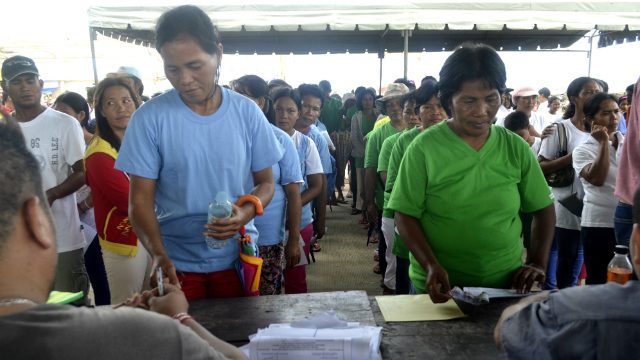SUMMARY
This is AI generated summarization, which may have errors. For context, always refer to the full article.

MANILA, Philippines – Senator Teofisto Guingona III on Tuesday, September 22, moved to “set in stone” the Pantawid Pamilyang Pilipino Program (4Ps) as the lack of a law “poses a threat of discontinuation” after the end of the Aquino administration.
According to the chair of the Senate Committee on Health and Demography, Senate Bill No. 2960 seeks to ensure the life of the 4Ps – otherwise called Conditional Cash Transfer – of the Department of Social Welfare and Development to improve poverty reduction in the Philippines.
“This is a call to strengthen our indigent people’s capacity to withstand the effects of market volatility and income disruption while investing in the improvement of their human capabilities in the long run,” Guingona said.
The proposed bill also lobbies for the inclusion of the 4Ps funding in the General Appropriations Act.
The 1st quarter Social Weather Stations survey found that 51% of Filipinos consider themselves poor.
Under 4Ps, a family beneficiary receives as much as P1,400 ($32) monthly. In return, they have to follow conditions set by the DSWD including improved class attendance rates for children and regular checkups of both children and pregnant women.
In 2015, the DSWD targets to cover at least 4,400,000 families across the Philippines. (READ: Where in the Philippines are the Pantawid beneficiaries?)
Address the problems
There is no shortage of poverty alleviation programs in the country, Guingona noted, but the programs suffer from flaws, including “inadequate targeting, uncoordinated and fragmented provision of social protection services, and unsound policies.” (READ: Where is the money to fight poverty going?)
These problems identified by stakeholders pertaining to social protection programs can be addressed if a strong law is implemented for the 4Ps, he added.
Since it was implemented in 2008, the program has been slammed over alleged flaws such as its ineeffectiveness and misappropriation of funding.
Welfare Secretary Corazon Juliano-Soliman gave assurances the “full effect” of 4Ps will be seen in the long run. (READ: Soliman: Anti-poverty program takes time)
World Bank expert Ruslan Yemtsov, in a media briefing on Wednesday, September 23, praised the effectiveness of one of the country’s social safety nets.
According to him, at least 82% of the benefits of the 4Ps are felt by the bottom 40% of the Philippine population.
“The poor and vulnerable in the Philippines benefit from what is today one of the largest and best-targeted social safety net programs in the world,” Yemtsov said.
DSWD, according to Soliman, continues to purge the list of beneficiaries through the National Housing Targeting System for Poverty Reduction (NHTS-PR) and the Grievance Redress System (GRS).
As of August 2015, the NHTS-PR has assessed 10.7 million out of the target 15.3 million households. (READ: ‘Enhanced’ system safeguards Pantawid program – DSWD)
The constant monitoring of various sectors makes sure that the 4Ps program “continues to respond to the needs of the country’s poor and vulnerable.”
“What is good about this program is that many sectors are watching: media, local government, civil society groups, local leaders, and policy makers,” She said. “Their continuing feedback helps ensure improvements in the implementation of the program.” – Rappler.com
Add a comment
How does this make you feel?
There are no comments yet. Add your comment to start the conversation.